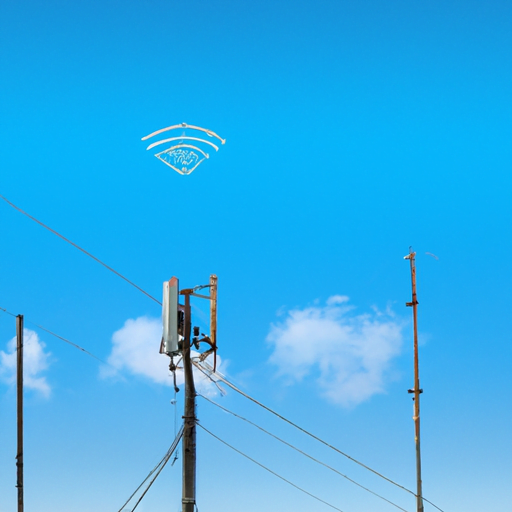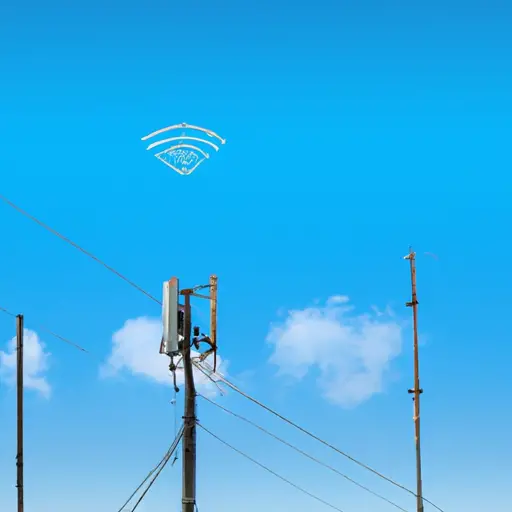So, you’ve decided to embrace the off grid lifestyle. No more relying on public utilities and living completely self-sufficiently. It’s an exciting choice, but one that comes with its challenges. One common question that often arises is, “Can you get internet if you live off the grid?” Well, the answer is yes! Thankfully, there are solutions available that can help you stay connected even in the most remote areas.
Living off the grid doesn’t mean you have to disconnect from the world entirely. In fact, with the advancements in technology, there are now several options for getting internet access even in remote locations. Satellite internet, for example, provides a reliable connection no matter where you are. It uses satellite signals to transmit and receive data, allowing you to browse the web, stream videos, and even work remotely. While satellite internet may be slightly more expensive than traditional options, it’s a viable solution for those choosing to live off the grid.
Another option to consider is cellular internet. Most cellular providers now offer plans specifically designed for rural areas, where traditional internet options may not be available. These plans utilize the cellular network to provide internet access, allowing you to stay connected using your smartphone, tablet, or laptop. However, it’s important to note that the availability and quality of cellular internet may vary depending on your location.
In addition to these options, there are also community networks and wireless internet service providers (WISPs) that cater to off grid living. These networks utilize a combination of technologies, such as point-to-point wireless links and mesh networks, to provide internet access to rural and remote areas. While these solutions may require some initial setup and investment, they can offer a reliable and cost-effective way to get internet access off the grid.
In conclusion, living off the grid doesn’t mean you have to sacrifice internet connectivity. With satellite internet, cellular internet, community networks, and WISPs, there are several solutions available to keep you connected no matter where you choose to live. In our upcoming article, we’ll dive deeper into these options and provide some tips for choosing the right internet solution for your off grid lifestyle. Stay tuned!

Off Grid Living
Living off the grid has become a popular lifestyle choice for many individuals and families in recent years. The idea of being self-sufficient, living in harmony with nature, and reducing reliance on traditional utilities and infrastructure is appealing to a growing number of people. However, one question that often arises for those considering off grid living is whether or not internet access is available. In this article, we will explore the benefits and challenges of off grid living, as well as the various internet solutions that are available for those who choose to embrace this lifestyle.
Benefits of Off Grid Living
Before diving into the topic of internet access, it’s important to understand the benefits that off grid living can offer. One of the main advantages is the ability to disconnect from the pressures and stress of modern life. When you live off the grid, you are not tied to the grid’s power supply, so you have the freedom to generate your own electricity through renewable energy sources such as solar panels or wind turbines. This not only reduces your carbon footprint but also allows you to save money on energy bills in the long run.
Another benefit of living off the grid is the opportunity to live a more sustainable and self-sufficient lifestyle. By growing your own food, collecting rainwater, and utilizing composting systems, you can reduce your reliance on external resources and become more environmentally friendly. Additionally, off grid living provides a sense of independence and self-reliance, as you are able to meet your own needs without depending on outside infrastructure.
Challenges of Off Grid Living
While there are many advantages to off grid living, it’s essential to acknowledge the challenges that come along with it. One of the main difficulties is the lack of access to traditional utilities, such as electricity and water. Without a connection to the power grid, you must rely on alternative energy sources and methods of water collection and filtration. This requires careful planning and investment in renewable energy systems and water management solutions.
Another challenge of off grid living is the limited availability of modern conveniences. For example, living off the grid often means being situated in remote or rural areas, where access to amenities like grocery stores, medical facilities, and schools may be limited. This can require more effort and planning to ensure that essential needs are met.
Is Internet Access Available for Off Grid Living
Now, let’s address the burning question: can you get internet if you live off the grid? The answer is yes, it is possible to have internet access even if you choose to live off the grid. However, the availability and reliability of internet solutions may vary depending on your location and the specific method of off grid living you have chosen.
Finding Internet Solutions for Off Grid Living
Satellite Internet
One option for off grid internet access is satellite internet. Satellite internet uses a network of satellites in space to provide internet connectivity to remote areas where terrestrial infrastructure is lacking. This means that you can have internet access regardless of your location, as long as you have a clear view of the sky.
Cellular Internet
Another option is cellular internet. If you have a strong cellular signal in your area, you can use a cellular data plan to access the internet. This requires a compatible device, such as a smartphone or a dedicated cellular modem/router. The reliability and speed of cellular internet can vary depending on your location and the quality of the cellular network in your area.
Wireless Internet
Wireless internet is another solution for off grid living, particularly if you have access to a nearby wireless internet service provider (WISP). WISPs use radio waves to connect users to their network, providing internet access without the need for traditional wired connections. The range and speed of wireless internet can vary depending on the distance between your location and the WISP’s network infrastructure.
Fiber Optic Internet
While fiber optic internet is typically associated with urban areas and high-speed connections, it is possible to have fiber optic internet in off grid locations. However, this option may be limited and may require additional infrastructure and investment.

Satellite Internet for Off Grid Living
How Satellite Internet Works for Off Grid Living
Satellite internet works by transmitting and receiving data signals between a user’s location and a network of satellites in space. The user’s dish antenna sends and receives signals to and from the satellite, allowing for internet connectivity. This means that you can have internet access even in remote locations, as long as you have a clear view of the southern sky.
Pros and Cons of Satellite Internet for Off Grid Living
One of the main advantages of satellite internet for off grid living is its availability. Since it relies on satellites in space, it can reach even the most remote locations. Additionally, satellite internet providers often offer a variety of plans and packages to suit different needs and budgets.
However, there are some drawbacks to satellite internet. One of the main challenges is latency, or the delay in data transmission due to the long distance that signals must travel to and from space. This can result in slower response times, which can be frustrating for activities such as online gaming or video conferencing. Additionally, satellite internet plans may have data caps or slower speeds during peak times, which can limit your usage.
Cellular Internet for Off Grid Living
How Cellular Internet Works for Off Grid Living
Cellular internet relies on the same technology that allows your smartphone to connect to the internet. It uses cellular networks, which consist of multiple cell towers that transmit and receive data signals. To access cellular internet, you need a device that can connect to these networks, such as a smartphone or a cellular modem/router.
Pros and Cons of Cellular Internet for Off Grid Living
One of the main advantages of cellular internet for off grid living is its widespread availability. Cellular networks cover a large portion of the population, even in rural and remote areas. This means that as long as you have a strong cellular signal, you can access the internet.
However, cellular internet may not be as reliable or fast as other options. The speed and quality of cellular internet can vary depending on your location and the number of users connected to the same cell tower. Additionally, cellular data plans may have data limits or slower speeds after reaching a certain usage threshold.
Wireless Internet for Off Grid Living
How Wireless Internet Works for Off Grid Living
Wireless internet for off grid living relies on wireless internet service providers (WISPs) that use radio waves to connect users to their network. WISPs typically have a network of towers or antennas that transmit and receive data signals.
Pros and Cons of Wireless Internet for Off Grid Living
One of the main advantages of wireless internet for off grid living is its flexibility and ease of installation. Since it does not require traditional wired connections, it can be set up relatively quickly and easily. Additionally, wireless internet can provide higher speeds and lower latency compared to satellite or cellular internet, depending on the proximity to the WISP’s network infrastructure.
However, wireless internet is dependent on the proximity to a WISP’s network infrastructure. If you are located far away from the nearest tower or antenna, the signal strength and speed may be compromised. Additionally, the availability of wireless internet providers may be limited in some areas.
Fiber Optic Internet for Off Grid Living
How Fiber Optic Internet Works for Off Grid Living
Fiber optic internet relies on thin strands of glass or plastic fibers that transmit data using light signals. This technology allows for incredibly fast and reliable internet connections, making it ideal for those who require high-speed internet access.
Pros and Cons of Fiber Optic Internet for Off Grid Living
One of the main advantages of fiber optic internet for off grid living is its speed and reliability. It provides symmetrical upload and download speeds, which is especially beneficial for activities such as video streaming, online gaming, or telecommuting. Additionally, fiber optic internet is less susceptible to interference from weather conditions or electrical sources.
However, the availability of fiber optic internet in off grid locations may be limited. Fiber optic infrastructure is typically deployed in urban areas, and extending it to remote or rural areas can be costly and challenging. Additionally, the installation and equipment required for fiber optic internet may be more complex and expensive compared to other options.
Factors to Consider when Choosing Internet for Off Grid Living
When choosing an internet solution for off grid living, there are several factors to consider:
Speed and Bandwidth
Consider your internet usage needs and the speed and bandwidth requirements of the activities you plan to do online. If you require high-speed internet for activities such as video streaming or online gaming, fiber optic or wireless internet may be the best options.
Reliability and Availability
Check the availability and reliability of the different internet solutions in your area. Satellite internet and cellular internet tend to have more widespread availability, while wireless internet and fiber optic internet may be more limited.
Cost and Affordability
Consider the cost of installation, equipment, and monthly service fees for each internet solution. Satellite internet may have higher upfront costs, while cellular internet and wireless internet may have lower initial expenses.
Installation and Equipment
Evaluate the installation requirements and equipment needed for each internet solution. Some options, such as satellite internet or fiber optic internet, may require professional installation, while others, like cellular internet or wireless internet, can be set up by the user.
Conclusion
In conclusion, internet access is indeed possible for those who choose to live off the grid. There are several internet solutions available, including satellite internet, cellular internet, wireless internet, and fiber optic internet. Each option comes with its own benefits and drawbacks, so it’s important to consider factors such as speed, reliability, cost, and installation requirements when selecting the right solution for your off grid lifestyle.
While living off the grid offers many benefits, having internet access can enhance your off grid experience. It allows you to stay connected with loved ones, access important information, and even work or study remotely. With the right internet solution, you can enjoy the best of both worlds – the freedom and independence of off grid living, combined with the connectivity and convenience of the internet.




